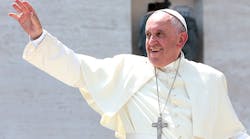The newest voice in the climate change discourse is a relatively unlikely one: Pope Francis.
Francis, in his 184-page encyclical, Laudato Si, or Praise Be, released June 18, tackles global warming – the first time a papal letter has been entirely devoted to discussion of the environment.
For the most part, the message Francis shares is not a new one; scientists for years have recognized the human impact on global warming and urged against use of fossil fuels and unchecked industrialization.
Where Francis departs from the core conversation, however, is in his assertion that climate change is both a moral and theological concern. For that reason, he directs his message about “our common home” to “all people,” not just to members of the Church.
Francis writes, “Now, faced as we are with global environmental deterioration, I wish to address every person living on this planet.”
He characterizes climate change as a problem largely affecting the poor, and thus frames it as humanity’s moral obligation to combat the destruction of the planet.
Francis writes, “The earth, our home, is beginning to look more and more like an immense pile of filth. In many parts of the planet, the elderly lament that once beautiful landscapes are now covered with rubbish.”
He encourages humanity to “become painfully aware, to dare to turn what is happening to the world into our own personal suffering and thus to discover what each of us can do about it.”
Francis issues a call to action for developed countries to set aside their differences and nationalistic priorities to work together for the betterment of the planet. He urges developed countries to repay their environmental debt by helping poorer countries establish sustainable practices and policies.
Francis writes, “Change is something desirable, yet it becomes a source of anxiety when it causes harm to the world and to the quality of life of much of humanity.”
These remarks come mere months before 196 of the world’s nations will converge in Paris for the United Nations Climate Change Conference, at which a new international climate change agreement will be drafted.
Lou Leonard, the World Wildlife Fund’s U.S. vice president of climate change, calls the encyclical a “clarion call to other world leaders” to “seize the moment in Paris; launch a new era of global climate cooperation that bridges the gap to a safer future for all.”
Leonard says Francis’s message is “is already resonating far beyond the 1.2 billion followers of the Catholic church.”
Likewise, the Sierra Club Executive Director Michael Brune says, “The Pope's historic message comes at a critical moment. Momentum is building for significant action during international negotiations in Paris and beyond to transition the world from fossil fuels to a healthy and just clean energy economy. The Pope’s Encyclical will only help continue that momentum.”
